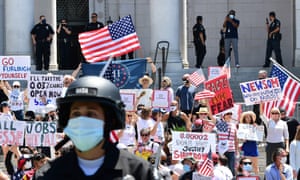They’re just pieces of cloth, but a passionate portion of the US population sees an attack on individual freedom
- Coronavirus – latest US updates
- Coronavirus – latest global updates

Photograph: Frederic J Brown/AFP via Getty Images
It is usually a cloth with two stretchy bands at two ends. You put it on your face so you can cover your mouth and nose, and it acts as a barrier to the rest of the world.
Masks, therefore, are very simple objects.
But in the US they are a huge source of controversy. While many Americans follow public health recommendations and wear masks in public to limit the spread of Covid-19, others passionately fight against them, saying they impair individual freedom.
Here’s what we know about the movement against masks in the US:
What is the controversy over masks in the US?
While polls show a majority of Americans wear masks when out in public, whether businesses and local governments should mandate mask usage has become a divisive political issue. A recent Pew Research Center poll found Democrats were more likely to say they wear masks than Republicans.
This is in line with messaging from leaders within the two parties.
Democratic leaders have been more vocal about the importance of face masks. Many Democratic governors have made it mandatory to wear masks in public. Joe Biden, the presumptive Democratic presidential nominee, said if he were in the White House, he would “do everything possible to make it required that people have to wear masks in public”.
In contrast, while many Republican leaders have also spoken out about the importance of masks, other top Republicans have been more hesitant to mandate masks, even as their states have started to see surges of new cases amid reopening phases. The most obvious of these is Donald Trump himself.
And though the Centers for Disease Control and Prevention (CDC) recommends wearing masks to prevent the spread of the virus, the US president has suggested wearing a mask could be seen as a political statement against him and mocked Biden for wearing a mask in public.
That message has reached the public, who have turned masks into a “culture war”. Some businesses have put up signs telling patrons they are required not to wear masks, while retail employees elsewhere have had to confront angry customers who refuse to wear them.
When did the backlash against masks in the US start?
What started as largely mask-less protests against shutdown orders has spiraled into wider anti-mask sentiment. As states have slowly begun to reopen their economies, many national chains and local businesses are requiring customers to wear face masks when in stores.

Thus businesses, and particularly their employees, are increasingly finding themselves on the frontlines of the mask debate. Stores that have been strict about masks have reported an uptick in angry customers who lash out when employees try to turn them away for not wearing masks. The most extreme case has been in Flint, Michigan, where an employee of a Family Dollar store was shot 4 May after telling a customer her daughter had to wear a face mask to enter the store.
Why do people say they are against masks?
Many who refuse to wear masks say it imposes on their individual freedom.
Reopen NC, a group that opposes shutdown orders in North Carolina, said masks were “muzzles” that, along with things like mandatory temperature checks, were “ways our freedom is being eroded”. The group started a “Burn Your Mask Challenge” where people post videos on social media of themselves burning their masks and use the hashtag “#IgniteFreedom”.
At a meeting of local leaders in Palm Beach, Florida, several people spoke in public about why they were against masks. Reasons varied from anger that masks “throw God’s wonderful breathing system out the door” to invoking a “plan-demic” conspiracy theory.
“You’re removing our freedoms and stomping on our constitutional rights by these communist dictatorship orders or laws you want to mandate,” one woman said at the hearing.
Some experts say part of the resistance to masks could stem from confusing public messaging that came from public health officials in the beginning of the pandemic. When the virus first appeared on US shores, public health officials said masks were not necessary for anyone who was not showing symptoms and discouraged people from buying them.
The CDC changed course in early April, saying that new research showed asymptomatic carriers were common spreaders of the virus, though some experts say the evidence for mask usage had already been clear. Anthony Fauci, the epidemiologist who leads the US response against Covid-19, admitted that a part of the reason why public health officials discouraged masks is because the US was experiencing a shortages of masks for essential healthcare workers.
What do public health officials now say about masks?
Public health experts unanimously agree that masks help slow the spread of Covid-19. The CDC and World Health Organization both released recommendations to the public to wear masks when social distancing is not possible.
Though masks alone will not completely halt the spread of the virus, recent research has shown that wearing them is the most efficient way to stop its transmission. Fauci, at a recent talk, said everyone should wear a mask in public and it “should not be a political issue. It is purely a public health issue.”



